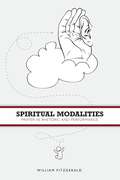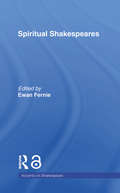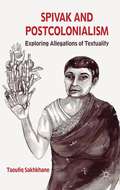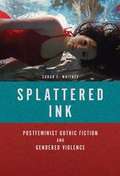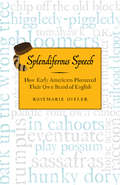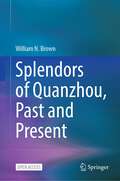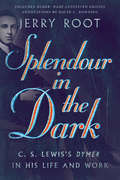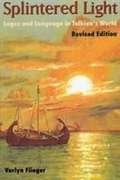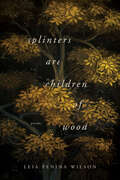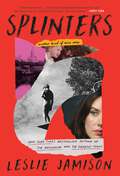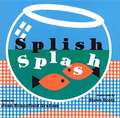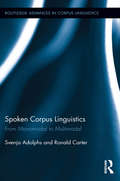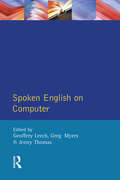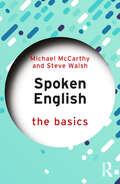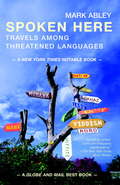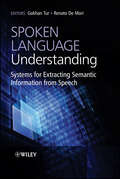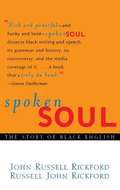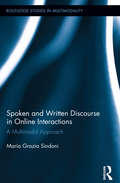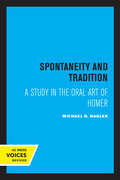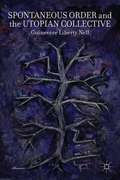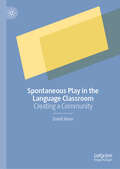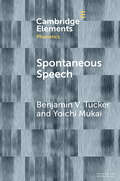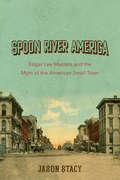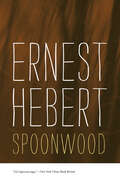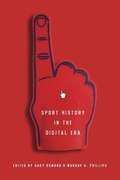- Table View
- List View
Spiritual Modalities: Prayer as Rhetoric and Performance
by William FitzGeraldA bold recasting of prayer as a rhetorical art, Spiritual Modalities investigates situations, strategies, and performative modes of discourse directed to divine audiences. Examining how prayer “works,” Spiritual Modalities reads prayer’s situations and strategies, its characteristic acts and attitudes, to advance an understanding of prayer as a basic expression of our rhetorical capacities for communication and communion. This groundbreaking analysis demonstrates how prayer draws on fundamental capacities to engage other beings rhetorically to argue that we are never more human than when we address the nonhuman. Spiritual Modalities is notable in its aim to articulate a critical rhetoric of prayer in a secular idiom. It draws on contributions to rhetorical theory from Kenneth Burke along with a broad range of classical and contemporary perspectives on audience, address, speech acts, and modes of performance. The book also takes a multicultural and multimodal approach to prayer as rhetorical performance. The texts and practices of prayer represented range across religious traditions and historical eras and include both verbal and physical modes of divine address. The book will be of interest to scholars researching religious language, Burkean approaches to discourse, practices of memory, and media studies.
Spiritual Shakespeares (Accents on Shakespeare)
by Ewan FernieSpiritual Shakespeares is the first book to explore the scope for reading Shakespeare spiritually in the light of contemporary theory and current world events. Ewan Fernie has brought together an exciting cast of critics in order to respond to the ‘religious turn’ in recent literary theory and to the spiritualized politics of terrorism and the ‘War on Terror’. Exploring a genuinely new perspective within Shakespeare Studies, the volume suggests that experiencing the spiritual intensities of the plays could lead us back to dramatic intensity as such. It tests spirituality from a political perspective, as well as subjecting politics to an unusual spiritual critique. Amongst its controversial and provocative arguments is the idea that a consideration of spirituality might point the way forward for materialist criticism. Reaching across and beyond literary studies to offer challenging and powerful contributions from leading scholars, this book offers unique readings of some very familiar plays.
Spivak and Postcolonialism
by Taoufiq SakhkhaneExploring, amongst other themes, representations of the other, strategies adopted to resist such representations, the issues of identity, nationalism, colonialism, feminism, subaltern studies and the English language within the context of Empire, this book projects a study of post-colonialism through the work of Gayatri Chakravorty Spivak.
Splattered Ink: Postfeminist Gothic Fiction and Gendered Violence
by Sarah E WhitneyIn-depth and refreshingly readable, Splattered Ink is a bold analysis of postfeminist gothic, a literary genre that continues to jar readers, reject happy endings, and find powerful new ways to talk about violence against women. Sarah E. Whitney explores the genre's challenge to postfeminist assumptions of women's equality and empowerment. The authors she examines--Patricia Cornwell, Jodi Picoult, Susanna Moore, Sapphire, and Alice Sebold--construct narratives around socially invisible and physically broken protagonists who directly experience consequences of women's ongoing disempowerment. Their works ask readers to inhabit women's suffering and to face the uncomfortable, all-too-denied fact that today's women must navigate lives fraught with risk. Whitney's analysis places the authors within a female gothic tradition that has long given voice to women's fears of their own powerlessness. But she also reveals the paradox that allows the genre to powerfully critique postfeminism's often sunshiney outlook while uneasily coexisting within the same universe.
Splendiferous Speech: How Early Americans Pioneered Their Own Brand of English
by Rosemarie OstlerWhat does it mean to talk like an American? According to John Russell Bartlett’s 1848 Dictionary of Americanisms, it means indulging in outlandish slang—splendiferous, scrumptious, higgeldy piggedly—and free-and-easy word creation—demoralize, lengthy, gerrymander. American English is more than just vocabulary, though. It’s a picturesque way of talking that includes expressions like go the whole hog, and the wild boasts of frontiersman Davy Crockett, who claimed to be “half horse, half alligator, and a touch of the airthquake.” Splendiferous Speech explores the main sources of the American vernacular—the expanding western frontier, the bumptious world of politics, and the sensation-filled pages of popular nineteenth-century newspapers. It’s a process that started with the earliest English colonists (first word adoption—the Algonquian raccoon) and is still going strong today. Author Rosemarie Ostler takes readers along on the journey as Americans learn to declare linguistic independence and embrace their own brand of speech. For anyone who wonders how we got from the English of King James to the slang of the Internet, it’s an exhilarating ride.
Splendors of Quanzhou, Past and Present
by William N. BrownThis open access book explores the past and present of Quanzhou (Zayton) and the rich diversity and tolerance that kindled Quanzhou’s innovativeness and helped it prosper both commercially and culturally—values that are today being embraced by China’s global trade partners. Quanzhou (Zayton), Marco Polo’s port of departure and Columbus’ goal in China, was not only the start of the Maritime Silk Road and the Middle Age’s greatest port but also centuries ahead of its time in its tolerance and diversity. The fabled “City of Light” had 7 mosques for its 40,000 Muslims, some of whom served in government, as well as 3 Franciscan cathedrals funded in part by the emperor, Jewish synagogues, and centers for Nestorian Christians, Hindus, Taoists, Manicheans, Jains, etc. As Franciscan Bishop Andrew of Perugia wrote in 1322, “Tis a fact that in this vast empire, there are people of every nation under heaven, and every sect, and all and sundry are allowed to live freely according to their creed.” In 2021, UNESCO designated “Quanzhou, Emporium of the World,” as a world heritage site, and the city is now the hub of the Belt and Road Initiative, the 21st Century Silk Road, which was inspired by ancient Quanzhou.
Splendour in the Dark: C. S. Lewis's Dymer in His Life and Work (Hansen Lectureship Series)
by Jerry RootSeveral years before he converted to Christianity, C. S. Lewis published a narrative poem, Dymer, under the pseudonym Clive Hamilton. Later, of course, Lewis became well known for his beloved imaginative stories, such as The Chronicles of Narnia and Till We Have Faces, as well as his ability to defend and articulate the faith in works such as Mere Christianity. But what about his literary work before his conversion? In this fourth volume in the Hansen Lectureship Series, Jerry Root contends that Lewis's early poem Dymer can not only shed light on the development of Lewis's literary skills but also offer a glimpse of what was to come in his intellectual and spiritual growth—a "splendour in the dark," to borrow one of Lewis's own lines from the poem. Under Root's careful analysis, Dymer becomes a way to understand both Lewis's change of mind as well as the way in which each of us is led on a journey of faith. This volume also includes the complete text of Dymer with annotations from David C. Downing, co-director of the Marion E. Wade Center. The Hansen Lectureship series offers accessible and insightful reflections by Wheaton College faculty members upon the transformative work of the Wade Center authors.
Splintered Light: Logos And Language In Tolkien's World
by Verlyn FliegerJ. R. R. Tolkien is perhaps best known for The Hobbit and The Lord of the Rings, but it is in The Silmarillion that the true depth of Tolkien’s Middle-earth can be understood. The Silmarillion was written before, during, and after Tolkien wrote The Hobbit and The Lord of the Rings. A collection of stories, it provides information alluded to in Tolkien’s better known works and, in doing so, turns The Lord of the Rings into much more than a sequel to The Hobbit, making it instead a continuation of the mythology of Middle-earth. Verlyn Flieger’s expanded and updated edition of Splintered Light, a classic study of Tolkien’s fiction first published in 1983, examines The Silmarillion and The Lord of the Rings in light of Owen Barfield’s linguistic theory of the fragmentation of meaning. Flieger demonstrates Tolkien’s use of Barfield’s concept throughout the fiction, showing how his central image of primary light splintered and refracted acts as a metaphor for the languages, peoples, and history of Middle-earth.
Splinters Are Children of Wood: Poems (Ernest Sandeen Prize In Poetry Ser.)
by Leia Penina WilsonThe wildly unrestrained poems in Splinters Are Children of Wood, Leia Penina Wilson's second collection and winner of the Ernest Sandeen Prize in Poetry, pose an increasingly desperate question about what it means to be a girl, the ways girls are shaped by the world, as well as the role myth plays in this coming of age quest. Wilson, an afakasi Samoan poet, divides the book into three sections, linking the poems in each section by titles. In this way the poems act as a continuous song, an ode, or a lament revivifying a narrative that refuses to adopt a storyline.Samoan myths and Western stories punctuate this volume in a search to reconcile identity and education. The lyrical declaration is at once an admiration of love and self-loathing. She kills herself. Resurrects herself. Kills herself again. She is also killed by the world. Resurrected. Killed again. These poems map displacement, discontent, and an increasing suspicion of the world itself, or the ways people learn the world. Drawing on the work of Bhanu Kapil, Anne Waldman, Alice Notley, and Mei-mei Berssenbrugge, Wilson's poems reveal familiarity and strangeness, invocation and accusation. Both ritual and ruination, the poems return again and again to desire, myth, the sacred, and body
Splinters: Another Kind of Love Story
by Leslie JamisonFrom the New York Times bestselling author of The Recovering and The Empathy Exams comes &“a blazing, unputdownable memoir&” (Mary Karr, author of Lit), the &“piercing, intimate&” story (TIME Magazine) of rebuilding a life after the end of a marriage—an exploration of motherhood, art, and new love. Leslie Jamison has become one of our most beloved contemporary voices, a scribe of the real, the true, the complex. She has been compared to Joan Didion and Susan Sontag, acclaimed for her powerful thinking, deep feeling, and electric prose. But while Jamison has never shied away from challenging material—scouring her own psyche and digging into our most unanswerable questions across four books—Splinters enters a new realm. In her first memoir, Jamison turns her unrivaled powers of perception on some of the most intimate relationships of her life: her consuming love for her young daughter, a ruptured marriage once swollen with hope, and the shaping legacy of her own parents&’ complicated bond. In examining what it means for a woman to be many things at once—a mother, an artist, a teacher, a lover—Jamison places the magical and the mundane side by side in surprising ways. The result is a work of nonfiction like no other, an almost impossibly deep reckoning with the muchness of life and art, and a book that grieves the departure of one love even as it celebrates the arrival of another. How do we move forward into joy when we are haunted by loss? How do we claim hope alongside the harm we&’ve caused? A memoir for which the very term tour de force seems to have been coined, Splinters plumbs these and other pressing questions with writing that is revelatory to the last page, full of linguistic daring and emotional acuity. Jamison, a master of nonfiction, evinces once again her ability to &“stitch together the intellectual and the emotional with the finesse of a crackerjack surgeon&” (NPR).
Splish Splash
by Joan Bransfield GrahamPresenting the many forms of water in concrete poems and graphic illustrations--including rain, snow, ocean waves, ice cubes, and tears--a clever book with bold illustrations plunges into the pleasures of poetry and the shapes of language.
Spoken Corpus Linguistics: From Monomodal to Multimodal (Routledge Advances in Corpus Linguistics #30)
by Ronald Carter Svenja AdolphsIn this book, Adolphs and Carter explore key approaches to work in spoken corpus linguistics. The book discusses some of the pioneering challenges faced in designing, building and utilising insights from the analysis of spoken corpora, arguing that, even though writing is heavily privileged in corpus research, the spoken language can reveal patterns of language use that are both different and distinctive and that this has important implications for the way in which language is described, for the study of human communication and for the field of applied linguistics as a whole. Spoken Corpus Linguistics is divided into two main parts. The first part sets the scene by discussing traditional and new approaches to monomodal spoken corpus analysis, with a focus on discourse organisation and conversational interaction and with particular attention to forms of language such as discourse markers and multi-word units, areas of language not conventionally described but which are argued to be of importance to spoken language description and to spoken language learning and teaching research within the field of applied linguistics. The second part of the book moves into the multimodal domain and focuses on alignments between language and gesture in a spoken corpus, with particular reference to gestural movements of the head and the hand and to the different ways in which prosody might be used to enhance communication. A brief final chapter discusses new developments in the area of spoken corpus research, including the relationship between language and context, emerging research methods as well as discussing possible shifts in scope and emphasis in spoken corpus research in the future.
Spoken English on Computer: Transcription, Mark-Up and Application
by Geoffrey Leech Jenny Thomas Greg MyersThis book has evolved from a Workshop on Computerized Speech Corpora, held at Lancaster University in 1993. It brings together the findings presented in a clear and coherent manner, focussing on the advantages and disadvantages of particular transcription or mark-up practice.
Spoken English: The Basics (The Basics)
by Steve Walsh Michael McCarthySpoken English: The Basics offers a clear, non-jargonistic introduction to what the study of spoken English entails, ranging from its basic phonology and the grammar and vocabulary of speaking to the role of speaking in society. The book describes and illustrates how spoken English is used in a globalised and technology-led world, using data from a range of contexts.Key features of this book include:• An introduction to the basics of the study of phonology, accents, and dialects• Discussions of the role of AI and its educational and language teaching applications• Examples from British English data, but with reference to spoken data from other varieties of English including North American English, Indian English, Hong Kong English, South African English, Kenyan English, Irish English, Caribbean English, second language learners and expert non-native usersFeaturing a glossary of key terms, this book will be of interest to students of several sub-disciplines where spoken English is involved, including corpus linguistics, ESOL/ELT, sociolinguistics, education and literacy, lingua franca and World English, among others, where often a knowledge of the workings of spoken language is assumed.
Spoken Here
by Mark AbleyWhether on the other side of the world or in our own backyard, languages everywhere are fading into oblivion. Mark Abley explores what the human family stands to lose -- and explains why some endangered languages continue to thrive.Within the next couple of generations, most of the world's 6000 languages will vanish, due mainly to the unstoppable tide of English. With an open mind and a well-worn passport, award-winning journalist and poet Mark Abley tells entertaining and vital stories about why languages matter. From Oklahoma to Provence, aboriginal Australia to Baffin Island, the cultures are radically different, but the problems of shrinking linguistic and cultural richness are painfully similar. Abley's investigation provides a stunning glimpse of the beauty and intricacies of languages like Yiddish and Yuchi, Mohawk and Manx, Inuktitut and Provençal. More importantly, it offers a sympathetic and memorable portrait of the people who still speak languages under threat.When a language dies out, gone too are stories that have been told for centuries, unique ways of seeing the world, and perhaps even ways of solving problems both large and small. Abley believes we must see languages as abundant sources of richness, wonder and usefulness. And he shows that hope still exists: that the determination of even one person can revive a whole language and its culture, in the process creating something new, changing and alive -- exactly what languages do best.From the Trade Paperback edition.
Spoken Language Understanding
by Renato De Mori Gokhan TurSpoken language understanding (SLU) is an emerging field in between speech and language processing, investigating human/ machine and human/ human communication by leveraging technologies from signal processing, pattern recognition, machine learning and artificial intelligence. SLU systems are designed to extract the meaning from speech utterances and its applications are vast, from voice search in mobile devices to meeting summarization, attracting interest from both commercial and academic sectors.Both human/machine and human/human communications can benefit from the application of SLU, using differing tasks and approaches to better understand and utilize such communications. This book covers the state-of-the-art approaches for the most popular SLU tasks with chapters written by well-known researchers in the respective fields. Key features include:Presents a fully integrated view of the two distinct disciplines of speech processing and language processing for SLU tasks.Defines what is possible today for SLU as an enabling technology for enterprise (e.g., customer care centers or company meetings), and consumer (e.g., entertainment, mobile, car, robot, or smart environments) applications and outlines the key research areas.Provides a unique source of distilled information on methods for computer modeling of semantic information in human/machine and human/human conversations.This book can be successfully used for graduate courses in electronics engineering, computer science or computational linguistics. Moreover, technologists interested in processing spoken communications will find it a useful source of collated information of the topic drawn from the two distinct disciplines of speech processing and language processing under the new area of SLU.
Spoken Soul: The Story of Black English
by John Russell Rickford Russell John Rickford"Spoken Soul brilliantly fills a huge gap... a delightfully readable introduction to the elegant interweave between the language and its culture."-Ralph W. Fasold, Georgetown University. "A lively, well-documented history of Black English... that will enlighten and inform not only educators, for whom it should be required reading, but all who value and question language." -Kirkus Reviews. "Spoken Soul is a must read for anyone who is interested in the connection between language and identity." -Chicago Defender Claude Brown called Black English "Spoken Soul." Toni Morrison said, "It's a love, a passion. Its function is like a preacher's: to make you stand out of your seat, make you lose yourself and hear yourself. The worst of all possible things that could happen would be to lose that language." Now renowned linguist John R. Rickford and journalist Russell J. Rickford provide the definitive guide to African American vernacular English from its origins and features to its powerful fascination for society at large.
Spoken and Written Discourse in Online Interactions: A Multimodal Approach (Routledge Studies in Multimodality)
by Maria Grazia SindoniWinner of the AIA Book Prize for a research monograph in the field of English Language and Linguistics (2016) Common patterns of interactions are altered in the digital world and new patterns of communication have emerged, challenging previous notions of what communication actually is in the contemporary age. Online configurations of interaction, such as video chats, blogging, and social networking practices demand profound rethinking of the categories of linguistic analysis, given the blurring of traditional distinctions between oral and written discourse in digital texts. This volume reconsiders underlying linguistic and semiotic frameworks of analysis of spoken and written discourse in the light of the new paradigms of online communication, in keeping with a multimodal corpus linguistics theoretical framework. Typical modes of online interaction encompass speech, writing, gesture, movement, gaze, and social distance. This is nothing new, but here Sindoni asserts that all these modes are integrated in unprecedented ways, enacting new interactional patterns and new systems of interpretation among web users. These "non verbal" modes have been sidelined by mainstream linguistics, whereas accounting for the complexity of new genres and making sense of their educational impact is high on this volume’ s agenda. Sindoni analyzes other new phenomena, ranging from the intimate sphere (i.e. video chats, personal blogs or journals on social networking websites) to the public arena (i.e. global-scale transmission of information and knowledge in public blogs or media-sharing communities), shedding light on the rapidly changing global web scenario.
Spontaneity and Tradition: A Study in the Oral Art of Homer
by Michael NaglerThis title is part of UC Press's Voices Revived program, which commemorates University of California Press’s mission to seek out and cultivate the brightest minds and give them voice, reach, and impact. Drawing on a backlist dating to 1893, Voices Revived makes high-quality, peer-reviewed scholarship accessible once again using print-on-demand technology. This title was originally published in 1974.
Spontaneous Order and the Utopian Collective
by Guinevere Liberty NellVladimir Lenin, Leon Trotsky, and Nikolai Bukharin were the three leaders of the Russian Revolution who shaped the new society most, both through their theories and their political leadership. All three were motivated by the ideal of building a utopian collective. Once in power, they tirelessly tried to put their vision into practice, but the Soviet system that resulted was nothing like the one they tried to create. In Spontaneous Order and the Utopian Collective, Nell takes her cue from the personal writings and documents of Lenin, Trotsky, and Bukharin to consider them anew from an Austrian theoretical perspective, analyze the divergence between theory and practice using a spontaneous order framework, and identify three interconnected prerequisites necessary for a utopian collectivist society. Nell then asks whether it might be possible to create this utopian collective somehow, and avoid the pitfalls of planning.
Spontaneous Play in the Language Classroom: Creating a Community
by David HannThis book investigates the importance of humour and play in the establishment of individual and group identities among adult language learners on an intensive business English course. The enclosed setting allows the emergent nature of community building and identity projection to be traced, foregrounding the important role of humorous play in these vital social processes. The book will be of interest to students and researchers of applied linguistics, second language acquisition and humour studies.
Spontaneous Speech (Elements in Phonetics)
by Yoichi Mukai Benjamin V. TuckerPhonetic research investigates how speakers and listeners use speech to convey messages. The speech produced to encode a particular message can vary wildly. Understanding and explaining the phonetic variability embodied in this example is one of the main motivations for this Element. Why and how do speakers produce this variability and how does it impact listeners? This Element focuses on spontaneous speech and its relationship with phonetic research. The authors discuss background and describe research investigating the variation that occurs when speakers and listeners are engaged in spontaneous, conversational speech. As a result, this Element explores aspects of spontaneous speech from the phonetic perspective using both production and perception areas of phonetics. This Element focuses on spontaneous speech and its relationship with phonetic research, exploring aspects of spontaneous speech from the phonetic perspective using both production and perception areas of phonetics.
Spoon River America: Edgar Lee Masters and the Myth of the American Small Town
by Jason StacyFrom Main Street to Stranger Things, how poetry changed our idea of small town life A literary and cultural milestone, Spoon River Anthology captured an idea of the rural Midwest that became a bedrock myth of life in small-town America. Jason Stacy places the book within the atmosphere of its time and follows its progress as the poetry took root and thrived. Published by Edgar Lee Masters in 1915, Spoon River Anthology won praise from modernists while becoming an ongoing touchstone for American popular culture. Stacy charts the ways readers embraced, debated, and reshaped Masters's work in literary controversies and culture war skirmishes; in films and other media that over time saw the small town as idyllic then conflicted then surreal; and as the source of three archetypes—populist, elite, and exile—that endure across the landscape of American culture in the twenty-first century. A wide-ranging reconsideration of a literary landmark, Spoon River America tells the story of how a Midwesterner's poetry helped change a nation's conception of itself.
Spoonwood: The Darby Chronicles #6 (The Darby Chronicles)
by Ernest HebertLife, love, death, and laughs in a small American town After almost fifteen years, Hebert has returned to this rich literary landscape for a new novel of the changing economic and social character of New England. Hebert's previous Darby book, Live Free or Die, recounted the ill-fated love between Freddie Elman, son of the town trash collector, and Lilith Salmon, child of Upper Darby gentility. At its conclusion, Lilith died giving birth to their son. As Spoonwood opens, Freddie, consumed by grief and anger and struggling with alcoholism, is not prepared to be a father to Birch. But as both his family and Lilith's begin to maneuver for custody of the child, Freddie embarks on a course of action that satisfies none of them. Once again, Hebert masterfully conveys the natural and social landscape of contemporary rural New England. Grounded in complex, fully realized characters, Spoonwood offers Hebert's most optimistic vision yet of acceptance and accommodation across class lines.
Sport History in the Digital Era
by Murray G Phillips Gary OsmondFrom statistical databases to story archives, from fan sites to the real-time reactions of Twitter-empowered athletes, the digital communication revolution has changed the way fans relate to LeBron's latest triple double or Tom Brady's last second touchdown pass. In this volume, contributors from Australia, Ireland, New Zealand, the United Kingdom, and the United States analyze the parallel transformation in the field of sport history, showing the ways powerful digital tools raise vital philosophical, epistemological, ontological, methodological, and ethical questions for scholars and students alike. Chapters consider how philosophical and theoretical understandings of the meaning of history influence engagement with digital history, and conceptualize the relationship between history making and the digital era. As the writers show, digital media's mostly untapped potential for studying the recent past via media like blogs, chat rooms, and gambling sites forge a symbiosis between sports and the internet while offering historians new vistas to explore and utilize. In this new era, digital history becomes a dynamic site of enquiry and discussion where scholars enter into a give-and-take with individuals and invite their audience to grapple with, rather than passively absorb, evidence. Timely and provocative, Sport History in the Digital Era affirms how the information revolution has transformed sport and sport history--and shows the road ahead. Contributors include Douglas Booth, Mike Cronin, Martin Johnes, Matthew Klugman, Geoffery Z. Kohe, Tara Magdalinski, Fiona McLachlan, Bob Nicholson, Rebecca Olive, Gary Osmond, Murray G. Phillips, Stephen Robertson, Synthia Sydnor, Holly Thorpe, and Wayne Wilson.
